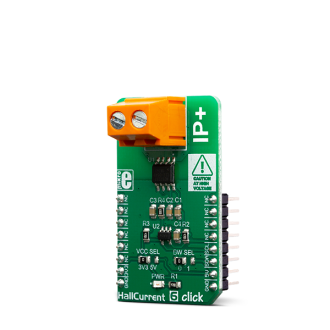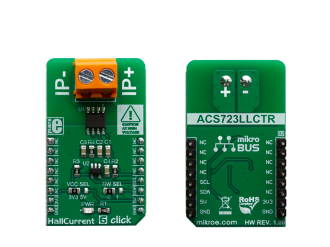
We strongly encourage users to use Package manager for sharing their code on Libstock website, because it boosts your efficiency and leaves the end user with no room for error. [more info]

Rating:
Author: MIKROE
Last Updated: 2019-04-03
Package Version: 1.0.0.0
mikroSDK Library: 1.0.0.0
Category: Current sensor
Downloaded: 4657 times
Not followed.
License: MIT license
Hall Current 6 Click is a very accurate current measurement Click board, based on the ACS723 IC. This IC is a galvanically isolated current sensor, which utilizes the Hall-effect principle.
Do you want to subscribe in order to receive notifications regarding "Hall Current 6 click" changes.
Do you want to unsubscribe in order to stop receiving notifications regarding "Hall Current 6 click" changes.
Do you want to report abuse regarding "Hall Current 6 click".


Library Description
This library provides basic functionality for reading the current value and controlling the click board.
Key functions:
float hallcurrent6_getCurrent() - Reads Current data in mA.uint16_t hallcurrent6_readData() - Reads ADC current data.Examples description
The application is composed of the three sections :
void applicationTask()
{
char demoText[ 50 ];
float Current;
Current = hallcurrent6_getCurrent();
mikrobus_logWrite(" Current value: ", _LOG_TEXT);
FloatToStr(Current, demoText);
mikrobus_logWrite(demoText, _LOG_TEXT);
mikrobus_logWrite(" mA", _LOG_LINE);
mikrobus_logWrite(" ------------------------- ", _LOG_LINE );
Delay_ms( 1000 );
}
Other mikroE Libraries used in the example:
I2CConversionsAdditional notes and informations
Depending on the development board you are using, you may need USB UART click, USB UART 2 click or RS232 click to connect to your PC, for development systems with no UART to USB interface available on the board. The terminal available in all MikroElektronika compilers, or any other terminal application of your choice, can be used to read the message.